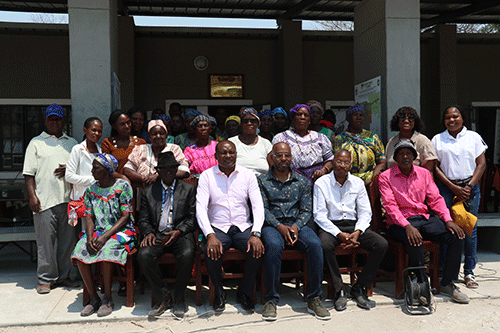Marythar Kambinda
KATIMA MULILO – The community members of Sikanjabuka in Zambezi region were delighted to officially receive the horticultural production project at their community forest office last Friday.
The project was funded under the ecosystem-based adaptation investment window under the Empower to Adapt Creating Climate Change Resilient Livelihoods through community-based natural resource management in Namibia.
Speaking at the handover, the minister of Environment, Forestry and Tourist, Pohamba Shifeta, said the abundant rainfall and fertile land in the Zambezi region give it enormous agricultural potential, which far surpasses any other region in the country.
Its wildlife, rivers, floodplains and forests undoubtedly position the region to contribute significantly to the national economy, said Shifeta.
He further said nearly 70% of Namibia’s population is directly dependent on subsistence agriculture and livestock farming; therefore, climate change presents a serious challenge to the community’s livelihoods.
“As you are aware, natural resources are the backbone of the Namibian economy, and we should safeguard its existence. The integrated Climate Change Adaptation project within the agroecological landscape of the Sikanjabuka community forest project is funded by the Environmental Investment Fund and is being implemented by the Sikanjabuka Community Forest within the region,” he said.
The project is aimed at increasing the adaptive capacity and improving the livelihood of the community distressed by the negative impacts of climate change.
He further noted the project would enhance crop production and productivity for food security and forest harvesting substitution through the adoption of climate-resilient smart farming technologies to support local livelihoods.
The minister further added the project would assist in encouraging and establishing enterprise development opportunities for communities, especially for the youth and vulnerable households in organic agriculture to create meaningful job opportunities.
“To date, a functional greenhouse system has been successfully established, with a 10 000-litre water tank installed on site,” said Shifeta.
The project recorded a bumper harvest early this year and generated an income of N$12 000, which has been invested back into the upkeep of the project, he said.
Shifeta commended the community for being patriotic in safeguarding natural resources and contributing towards sustainable food security in the country.
The CEO of the Environmental Investment Fund of Namibia, Benedict Libanda, speaking at the handover, said the philosophy of EIF is to support the communities that are committed towards sustainable natural resource management, including the utilisation of those resources to benefit the livelihood of the community.
The fund provides a grant to the community forest and has helped the community to rehabilitate three boreholes, a greenhouse and a tractor to be used for ploughing by the farmers.
“We are also financing the hammer mill, which we hope by the end of this year will be up and running to assist the adaptation, livelihood, diversification, food security as well as poverty alleviation within the community,” he said.
He added the borehole would be able to provide water for between 150 to 200 livestock, which is important to maintain the rural economy of this community.
“Bee-keeping and honey production is also doing well – and now, we just need to work on ensuring there is a market for honey,” said Libanda.
Delighted with the progress so far, Annety Mweti, who works at the community forest, said the project has helped in improving their livelihood, especially the use of the tractor, which helps to assist those who could barely get by.
We also have a greenhouse as well as bees to provide honey for sale.
We have learnt a great deal from the project, as we are now able to do the same and provide for our families.
The community members have also been very supportive of the project, said Mweti.


